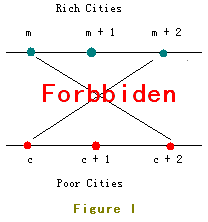JGShining‘s kingdom consists of 2n(n is no more than 500,000) small cities which are located in two parallel lines.
Half
of these cities are rich in resource (we call them rich cities) while
the others are short of resource (we call them poor cities). Each poor
city is short of exactly one kind of resource and also each rich city is
rich in exactly one kind of resource. You may assume no two poor cities
are short of one same kind of resource and no two rich cities are rich
in one same kind of resource.
With the development of industry,
poor cities wanna import resource from rich ones. The roads existed are
so small that they‘re unable to ensure the heavy trucks, so new roads
should be built. The poor cities strongly BS each other, so are the rich
ones. Poor cities don‘t wanna build a road with other poor ones, and
rich ones also can‘t abide sharing an end of road with other rich ones.
Because of economic benefit, any rich city will be willing to export
resource to any poor one.
Rich citis marked from 1 to n are located in Line I and poor ones marked from 1 to n are located in Line II.
The
location of Rich City 1 is on the left of all other cities, Rich City 2
is on the left of all other cities excluding Rich City 1, Rich City 3
is on the right of Rich City 1 and Rich City 2 but on the left of all
other cities ... And so as the poor ones.
But as you know, two
crossed roads may cause a lot of traffic accident so JGShining has
established a law to forbid constructing crossed roads.
For example, the roads in Figure I are forbidden.

In
order to build as many roads as possible, the young and handsome king
of the kingdom - JGShining needs your help, please help him. ^_^
Each
test case will begin with a line containing an integer n(1 ≤ n ≤
500,000). Then n lines follow. Each line contains two integers p and r
which represents that Poor City p needs to import resources from Rich
City r. Process to the end of file.
For each test case, output the result in the form of sample.
You should tell JGShining what‘s the maximal number of road(s) can be built.
Case 1:
My king, at most 1 road can be built.
Case 2:
My king, at most 2 roads can be built.
#include <iostream>
#include <algorithm>
#include <cstring>
#include <cstdio>
#include <vector>
#include <iomanip>
#include <cmath>
#include <ctime>
#include <map>
#include <set>
using namespace std;
#define lowbit(x) (x&(-x))
#define max(x,y) (x>y?x:y)
#define min(x,y) (x<y?x:y)
#define MAX 100000000000000000
#define MOD 1000000007
#define pi acos(-1.0)
#define ei exp(1)
#define PI 3.141592653589793238462
#define INF 0x3f3f3f3f3f
#define mem(a) (memset(a,0,sizeof(a)))
typedef long long ll;
int x,dp[100006],n,t;
struct Node
{
int x;
int y;
friend bool operator<(const Node &a,const Node &b)
{
return a.x==b.x?a.y<b.y:a.x<b.x;
}
}node[100006];
int main()
{
int it=0;
while(scanf("%d",&n)!=EOF)
{
int top=0;
for(int i=0;i<n;i++)
scanf("%d%d",&node[i].x,&node[i].y);
sort(node,node+n);
for(int i=0;i<n;i++)
{
if(i && node[i].x==node[i-1].x)continue;
if(node[i].y>dp[top]) dp[++top]=node[i].y;
else
{
int l=1,r=top;
while(l<=r)
{
int mid=(l+r)>>1;
if(node[i].y>dp[mid]) l=mid+1;
else r=mid-1;
}
dp[l]=node[i].y;
}
}
printf("Case %d:\n",++it);
if(top==1) printf("My king, at most %d road can be built.\n\n",top);
else printf("My king, at most %d roads can be built.\n\n",top);
}
return 0;
}
